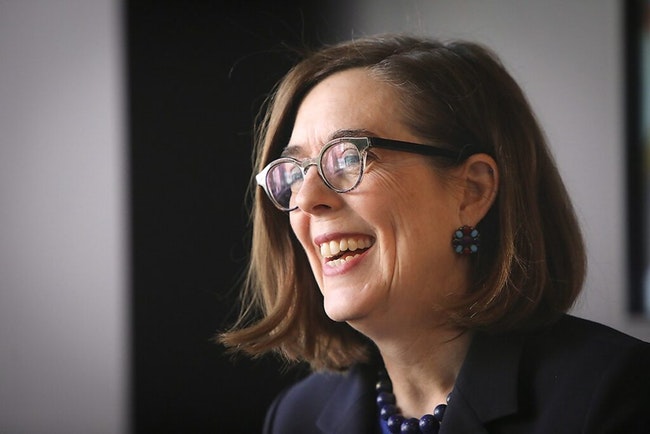
Oregon Gov. Kate Brown (Amanda Loman/Salem Reporter)
Gov. Kate Brown wants Oregonians to quit wasting food to help reduce greenhouse gases.
The initiative to do so took Brown halfway around the world to the United Nations l Climate Change Conference in Glasgow, Scotland, last month.
The Oregon governor explained the state’s drive to cut down on food waste as a panelist at the international gathering called COP26.
For Brown and the state, reducing food waste isn’t about clearing out the refrigerator crisper.
It’s about paring back on carbon emissions by not growing and transporting food that won’t get eaten.
And keeping food out of the garbage pail is just one part of Brown’s ambitious effort, mapped out in detail in 2020, to put Oregon in a leading role on addressing climate change.
“It was important that Oregon participate in this climate change summit,” Brown said in an interview with the Capital Chronicle. “We are a leader on so many different levels.”
She returned home more enthused about what’s possible.
“Climate change is hitting us all like a hammer in the head,” Brown said. “We are all suffering.”
She noted the 96 deaths in Oregon during the “heat dome” episode last summer that produced record-breaking temperatures.
She described walking through a blackberry farm outside of Salem with owners Brian and Martin Taylor.
“They were devastated by this heat dome,” she said. “I saw dried berries. They were worthless.”
And the governor pointed out that thousands of Oregonians lost homes and businesses to wildfires of 2020 that officials estimate cost $1.15 billion.
.Those 4,000 families, Brown said, “know we have to be adaptive.”
She is adamant Oregon needs to stay on course because “doing nothing is not an option.”
She pushed back on claims that state initiatives are too costly.
“We are already paying for it,” Brown, citing the lost farm crops, inadequate drinking and irrigation water in the Klamath Basin and the catastrophic cost of wildfires.
She said the global summit “highlighted some things we should be doing in Oregon that we’re not yet,” she said.
Brown said she brought home from COP26 a determination to increase her “focus and commitment” to developing offshore wind-generated energy.
The 2021 Legislature directed the Oregon Department of Energy to report by September 2022 on prospects for offshore energy production.
Brown said the options for such electricity production off the Oregon coast are “better than any other location on the entire West Coast.”
She said she connected with experts in the field while in Glasgow and now wonders if southern Oregon can also become home to manufacturers to produce the equipment needed.
That would add “really good paying, sustainable jobs,” Brown said.
“Could Coos Bay or North Bend or even Brookings be the Hood River of wind technology?” she asked.
Brown said she shared in Glasgow the state’s commitment to focus on “historically underserved” people and communities who are “being disproportionately impacted by climate change.”
She cited the impact of wildfires in southern Oregon, which leveled mobile home parks and particularly hit undocumented families. She said the deaths caused by the heat dome involved people becoming hyperthermic in their own homes for lack of cooling systems. Making heat pumps more readily available will be one response, she said.
Brown expects the state’s campaign to reduce food waste can help drive down the contribution Oregonians make to greenhouse gases.
The state Department of Environmental Quality in October launched a $350,000 Bad Apple Campaign to convince Oregonians they can save money and help dial back greenhouse emissions.
Agency officials say that nationally about 35% of food in the U.S. is wasted, meaning the processes to produce and deliver that food generated greenhouse emissions but no benefit. And the wasted food heading into landfills adds to the carbon emissions, Brown said.
The campaign doesn’t rely on high-brow environmental claims. Rather, it points out that for a typical Oregon family, about $1,600 worth of food spoils and goes unused in a year.
“We want to encourage consumers to be more careful about what it is they purchase,” Brown said. “You end up saving money. That message has been shown to resonate with Oregon consumers.”
Brown thinks Oregon can help other states and countries with their climate initiatives. She returned from Glasgow thinking about how the state’s universities could become a research resource beyond Oregon’s borders.
The governor is well aware that some Oregonians don’t believe in the climate change efforts.
Republicans in the Oregon Senate in early 2020 boycotted the session to stop climate change legislation.
Caucus offices for the Senate and House Republicans didn’t respond to email requests for comment Thursday about their current posture on climate change.
“When people are unwilling or unable to see facts, it makes conversations really challenging,” Brown said.
She said translating climate change steps into economic benefits for Oregonians is essential.
“We figure out ways to make sure we do it through their pocketbook,” Brown said.
She remains undeterred by political opposition and expects Oregon to continue adapting.
“We literally do not have a choice,” Brown said.
Oregon Capital Chronicle is part of States Newsroom, a network of news bureaus supported by grants and a coalition of donors as a 501c(3) public charity. Oregon Capital Chronicle maintains editorial independence. Contact Editor Les Zaitz for questions: [email protected]. Follow Oregon Capital Chronicle on Facebook and Twitter.
NEWS TIP? Please send an email to [email protected] for our reporters to consider.




